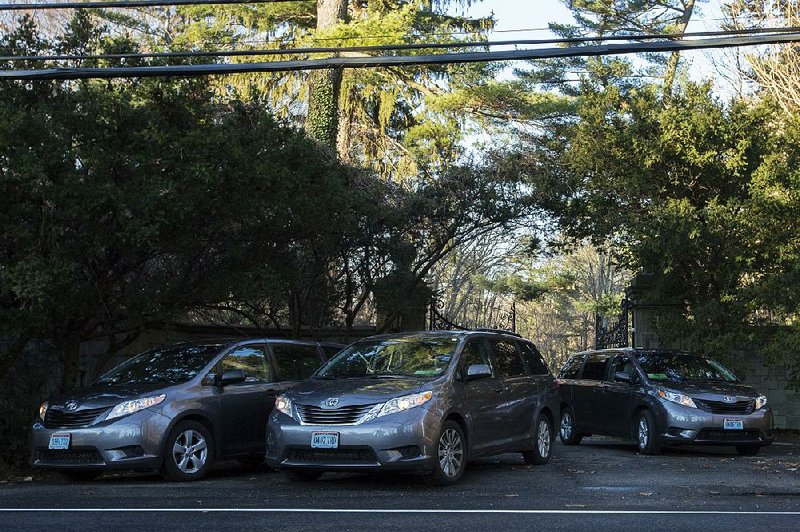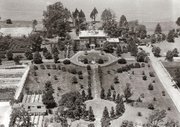Without warning, American agents descend on a Russian-owned compound in rural Maryland. A similar surprise unfolds at an estate on New York's Long Island. Both locations are accused of hosting Russian spies on American soil, and once again, two nuclear powers are at each other's throats.
It sounds dramatic, but all this happened Thursday, as American officials punished the Russian government on allegations of hacking Democratic officials to influence the 2016 presidential election.
The measures ordered by President Barack Obama included the expulsion of 35 Russian diplomatic officials accused of working as intelligence officers, plus sanctions against Russian cyber-agents and companies accused of supporting hacking of the Democratic National Committee.
But it's Obama's order to shut down two Russian-owned mansions -- best known as quiet getaways for diplomatic officials -- that has raised eyebrows the most.
On Maryland's Eastern Shore, about 60 miles east of the nation's capital, a three-story, red-brick mansion and almost a dozen cottages sit on the banks of the Corsica River.
The Soviet Union bought the property in 1972 and transferred it to the Russian Federation in the 1990s, and the 45-acre compound also holds tennis courts, a swimming pool and playground equipment. It's mostly known to the Maryland community of Centreville for hosting parties and sailing regattas on Labor Day, if it's known at all.
"If you didn't know they were here, you wouldn't know they were here," said George Sigler, president of Centreville's town council and a retired Marine, describing the compound as a place where Russians working in the embassy in Washington could "come to let their hair down and relax."
The ordered shutdown of the compound caught Sigler by surprise. He had never recalled hearing of anything suspicious happening there, nor of Russian guests misbehaving in the community, where they would shop, eat, get haircuts and buy groceries and alcohol; one local liquor store had stocked up on vodka to serve Russian customers.
Sigler recalled visiting the property for a Labor Day picnic last year and "drinking copious amounts of Russian vodka."
Sigler said he mentioned to the Russian ambassador that he didn't think he could get vodka like that in the U.S. The next day, a Russian aide arrived at Centreville City Hall with a couple of bottles.
"They're good neighbors, and have been the whole time they've been there," Sigler said.
A 14-acre property in Upper Brookville, Long Island, also was ordered closed.
At a news briefing, Obama administration officials did not give details on what kind of spying they believed happened at the compounds in Maryland and Long Island, except that they "were used for intelligence collection activities" as well as for recreation.
During the Cold War, the U.S. and Soviet Union restricted the movements of each other's visiting diplomats, requiring them to stick to certain parts of each other's countries. A high-ranking Soviet defector, the diplomat Arkady Shevchenko, said at least one of the Russian-owned mansions on Long Island served double duty as electronic surveillance posts for the Soviet Union's intelligence agency, the KGB.
"When I first came to the United States in 1958, there were three or four KGB communications technicians and their gear sharing the former servants' quarters in the attic," Shevchenko wrote of the Soviets' Killenworth mansion on Long Island in a 1985 memoir, Breaking with Moscow.
"By 1973, the specialists in intercepting radio signals numbered at least a dozen, and they had taken over the whole floor," wrote Shevchenko. "Their equipment occupied so much space, in fact, that one of the two large unused greenhouses had been commandeered to store it. These quarters were off limits to other personnel."
Shevchenko, who died in 1998, also told the Norwich Bulletin newspaper that the Soviets were pleased after buying the Maryland compound in 1972 and added that the property's location was "not accidental."
"I'm not privy to the details, but I remember how happy they were when they bought this estate," Shevchenko reportedly said.
If there was spying going on in Maryland, it may have gone both ways. Soviet officials once complained to U.S. officials that they found a cable and a device attached to the compound's internal phone system in 1977.
In Centreville, comments on the residents' Facebook page were mostly critical of Obama's decision to shut down the Russian compound, according to Sigler, who also had his doubts about the spying claims.
"Were they spying on anybody? I wouldn't know why. It's just a sleepy little town on a sleepy little river," Sigler said, adding, "Once this all blows over, they'll probably come back."
A Section on 01/01/2017



